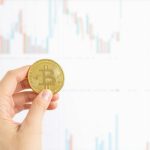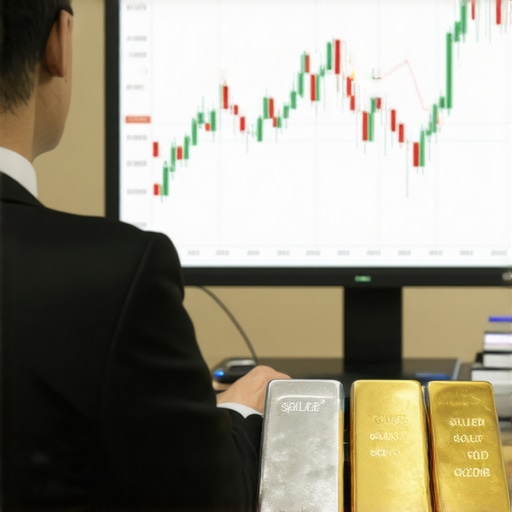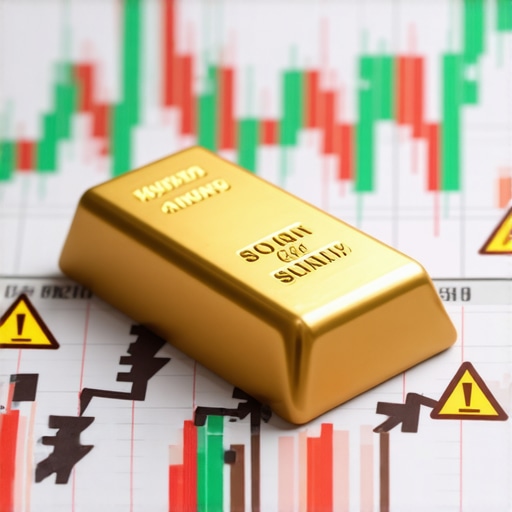My First Gold Purchase: A Lesson in Trust and Caution
When I first decided to buy gold in early 2026, I was both excited and nervous. The idea of owning physical gold bars felt like a solid way to protect my wealth against economic uncertainty. However, the challenge was clear: how do I find trustworthy gold dealers in a market flooded with options and potential scams? I quickly realized that buying gold safely is just as important as picking the right investment.
Why Trustworthiness Matters More Than Ever in 2026
Gold remains a timeless asset, but the rise of online platforms and global demand shifts have made it easier to fall prey to dishonest sellers. From my experience, the key to choosing trusted gold dealers lies in verifying reputation, transparency, and certifications. For example, I always look for dealers affiliated with recognized organizations like the London Bullion Market Association (LBMA). Such affiliations provide a level of assurance about the authenticity and quality of the gold being sold.
How Do I Verify a Gold Dealer’s Credibility?
What questions should I ask before buying gold from a dealer?
One of the most useful strategies I’ve adopted is asking direct questions about the source of their gold, return policies, and how they authenticate their products. Trusted dealers openly provide assay certificates and detailed product information. I also cross-check customer reviews and consult forums where experienced investors share their insights. In addition, I found resources like this guide on finding trusted gold dealers invaluable for spotting red flags and best practices.
Why Personal Experience and Expert Advice Should Guide Your Choices
Over time, I realized that buying gold is not just a transaction but a relationship with your dealer. Some of the best experiences I had were with sellers who offered transparent pricing and detailed explanations about market trends. For instance, understanding how inflation and global forces shape gold prices helped me make more informed decisions and avoid impulsive buys from suspicious dealers.
How I Approach Safe Gold Purchases in 2026
My process now includes thorough research, requesting certifications like the hallmark and assay certificates, and preferring dealers with physical storefronts or well-reviewed online reputations. I also consider secure payment methods that offer buyer protection. These steps have saved me from potential fraud and ensured my gold investments are genuine and safely acquired.
If you’ve had experiences with gold dealers—good or bad—I’d love to hear your stories and tips in the comments below. Sharing what’s worked for you can help us all become smarter and safer investors.
Exploring Verification Tools Beyond Certifications for Gold Dealers
While certifications like hallmark and assay certificates are essential, advanced investors often use additional verification tools to confirm authenticity. For example, some dealers provide serial numbers for gold bars and coins that can be independently verified through manufacturer databases. This added layer of traceability helps ensure that the gold is not counterfeit or tampered with.
Moreover, digital platforms now offer blockchain tracking for certain gold products, allowing buyers to follow the chain of custody from mine to market. This technology significantly enhances transparency and trust, especially important given the rise in global gold demand and shifting supply chains in 2026.
Can Emerging Technologies Revolutionize Trust in Gold Trading?
Experts are increasingly asking whether blockchain and AI-powered analytics could become standard in verifying gold transactions. These technologies could reduce fraud risk by providing immutable records and predictive market insights. However, widespread adoption depends on dealer willingness and regulatory frameworks evolving to support such innovations.
For investors, staying informed about these technological advances and seeking dealers who embrace them can provide a competitive edge and greater confidence in their gold investments.
Balancing Online and Physical Gold Dealer Choices
Choosing between online and physical gold dealers requires careful consideration. Physical stores offer the advantage of in-person inspection and immediate possession, which can be reassuring for first-time buyers. However, online dealers often provide better pricing due to lower overhead costs and broader product selections.
To mitigate risks associated with online purchases, verify that the dealer offers secure payment options, transparent return policies, and visible customer feedback. Utilizing resources like trusted gold dealer guides can help you navigate these choices wisely.
How Central Bank Purchases Influence Dealer Trustworthiness and Market Prices
Central bank gold buying has a profound impact on both market prices and dealer credibility. When central banks increase their gold reserves, it often signals confidence in gold’s stability, prompting dealers to adjust offerings and pricing accordingly. Dealers linked with reputable suppliers who monitor central bank activities tend to have more stable pricing and inventory.
Understanding these dynamics can help investors identify dealers who are well-informed and aligned with global market trends. For a deeper dive into this topic, see how central bank gold buying influences price trends.
By integrating awareness of macroeconomic factors and dealer practices, investors can make smarter decisions and avoid pitfalls in volatile markets.
Have you experienced challenges or successes in finding trusted gold dealers? Share your insights in the comments below to help build a knowledgeable community. Also, if you want to expand your understanding of market dynamics, check out our detailed analysis on gold market analysis and central bank effects.
The Subtle Art of Building Long-Term Trust with Gold Dealers
Reflecting on my journey, I realize that trust in gold dealers extends beyond certifications and surface-level assurances. It’s about developing a relationship that withstands market volatility and evolving economic landscapes. Early on, I underestimated how much dealer responsiveness and clear communication would factor into my comfort level. Trust isn’t just built on paperwork but on consistent, transparent dialogue.
For instance, some dealers proactively share market insights or update customers about shifts in supply-demand dynamics, which I found invaluable. This ongoing engagement fosters a sense of partnership rather than a mere transactional interaction. It reminds me of the insights from the smart gold investment strategies to hedge against inflation guide, which emphasizes how well-informed communication is key to navigating uncertain markets.
How Do You Balance Price Sensitivity with Dealer Credibility?
Is it worth paying a premium for a highly trusted dealer, or should one always chase the lowest price?
This is a question I still grapple with. When I first started, the lure of lower prices was tempting, but I soon learned that an unusually low price often signals risk—whether it’s quality compromise or hidden fees. Over time, I accepted that paying a reasonable premium for a dealer with a solid reputation, verified provenance, and excellent customer service is a form of insurance against costly mistakes.
In this context, understanding how inflation and global forces shape gold prices helped me realize that price fluctuations are natural and should not overshadow the importance of security and authenticity.
The Role of Global Economic Shifts in Choosing Your Dealer
2026 has been a year of significant economic shifts, from central bank gold purchases to changing industrial demands. I’ve observed that dealers who stay ahead by adapting to these macroeconomic trends tend to offer better advice and more stable pricing. For example, dealers aligned with suppliers who monitor central bank gold buying patterns often have insights that translate into smarter inventory management and pricing strategies.
By contrast, dealers disconnected from these broader market movements sometimes present outdated or less competitive offers, which can affect buyers adversely.
How Do Emerging Technologies Influence My Trust in Gold Dealers?
While I touched on blockchain and AI as future tools, I’ve started to notice early adopters among dealers who integrate these into their operations. For example, some are beginning to offer blockchain-verified gold products that allow tracking from mine to buyer. This level of transparency is a game-changer for me and many others seeking peace of mind.
However, it also introduces complexity. Not every dealer’s technology is equally trustworthy, and regulatory clarity remains murky. This means, as investors, we need to stay vigilant, educating ourselves about which technological solutions genuinely enhance trust and which are just marketing buzz.
For those curious about how to harness technology smartly, the mastering gold trading techniques resource offers excellent insights into leveraging analytical tools to navigate volatile markets.
Sharing Stories to Grow a Smarter Gold Buying Community
Every trusted gold purchase I’ve made has been a learning milestone, shaped by questions, mistakes, and aha moments. I believe that by sharing these nuanced experiences, we can collectively elevate our understanding and resilience as investors. Have you encountered moments when dealer trust was tested or confirmed in unexpected ways? Perhaps a dealer’s transparency saved you from a bad deal, or maybe a lack of clarity led to costly confusion.
I warmly invite you to share your stories and lessons in the comments. Together, we can build a community that not only seeks gold’s enduring value but also masters the intricate art of purchasing it safely and wisely.
Leveraging Data Analytics to Enhance Dealer Selection: Beyond Traditional Metrics
As my experience deepened, I discovered that relying solely on certifications and dealer reputations did not fully mitigate risks. The integration of data analytics into gold market evaluation has emerged as a transformative tool. By analyzing transactional data, price movements, and dealer behavior patterns, one can uncover subtle signals indicative of reliability or risk.
For instance, some platforms utilize AI-driven sentiment analysis on dealer reviews and social media mentions, providing a dynamic and real-time gauge of credibility. This goes beyond static certifications, allowing investors to detect shifts in dealer trustworthiness before they become widespread knowledge.
What are the limitations and ethical considerations when using AI and data analytics for dealer verification?
While AI offers powerful insights, it also raises concerns regarding data privacy, algorithmic bias, and transparency. Overreliance on automated systems without human judgment can lead to misinterpretation of nuanced contexts or false positives. Ethical deployment requires clear disclosure of data sources, methodologies, and continuous validation against empirical outcomes.
This balanced approach ensures that technology acts as an augmenting force rather than an unquestioned authority. Detailed discussions on these emerging paradigms can be found in mastering gold trading techniques, which delve into how analytical tools can enhance decision-making while managing inherent risks.
Integrating Macro Trends with Dealer Intelligence for Portfolio Resilience
Another advanced insight I embraced was the synthesis of macroeconomic indicators with granular dealer data. Understanding supply-demand dynamics in 2026, alongside dealer inventory turnover and pricing strategies, enables a holistic assessment of market positioning.
For example, a dealer consistently aligned with upstream supply fluctuations—such as mining outputs or refiners’ capacities—often signals robust sourcing networks. Coupled with awareness of global economic shifts, including central bank policies and industrial gold demand trends, this informs not only trustworthiness but also timing and price advantages.
These multi-layered analyses require ongoing education and engagement with specialized resources, but they significantly elevate the investor’s capacity to secure genuine assets amid volatility.
Personal Reflections on the Evolving Gold Dealer Landscape in 2026
Reflecting on these developments, I recognize that the gold dealer ecosystem is rapidly transforming. Dealers who invest in transparency, technological integration, and client education stand apart in credibility. Conversely, those resistant to evolve often struggle with trust deficits, which manifest in less favorable pricing and customer feedback.
This evolution challenges investors like myself to cultivate a proactive mindset—continuously updating verification criteria, embracing sophisticated tools, and fostering open communication channels with dealers. Such an approach turns the transactional nature of gold purchases into a strategic partnership aimed at wealth preservation and growth.
If you are navigating this complex landscape, I encourage you to share your advanced strategies or questions below. Engaging with a community committed to deepening collective wisdom enriches every investor’s journey.
Things I Wish I Knew Earlier (or You Might Find Surprising)
Trust Is More Than Just Certificates
When I started buying gold, I thought a hallmark or assay certificate was enough to guarantee authenticity. Over time, I realized that while these are important, the dealer’s communication style and willingness to share market insights mattered just as much. A dealer who educates you and keeps you updated earns my trust far beyond paperwork.
Technology Can Be Both a Blessing and a Challenge
Blockchain tracking and AI-powered verification tools sound impressive, but I found that not all dealers use these technologies equally well. It’s important to understand the limitations and not blindly trust tech labels without verifying how transparent and regulated these systems really are.
Price Isn’t Everything — Quality and Security Matter More
Early on, I chased the lowest prices and sometimes ended up with confusing terms or lower-quality products. Paying a reasonable premium for a reputable dealer felt like insurance against fraud or hidden fees. The peace of mind was worth it, especially as gold prices fluctuate due to inflation and global forces.
Dealer Relationships Can Shape Your Investment Journey
I never expected that building a good rapport with my gold dealer would become a key part of my strategy. Some dealers go beyond sales by proactively sharing market trends and supply-demand updates. This partnership approach helps me feel more confident, especially in volatile times.
Data Analytics Offer New Ways to Sense Dealer Trustworthiness
AI-driven sentiment analysis on reviews and social media is a powerful tool I started using to gauge dealer reliability in real time. However, it requires balancing automated insights with personal judgment to avoid jumping to conclusions prematurely.
Understanding Macro Trends Helps Spot the Best Dealers
Keeping an eye on central bank gold purchases and supply-demand shifts helped me identify dealers who are well-connected and informed. They often provide better pricing and inventory stability, which is crucial for strategic buying in 2026.
Resources I’ve Come to Trust Over Time
London Bullion Market Association (LBMA) — Their standards and dealer affiliations give a solid baseline for authenticity and market credibility.
Mastering Gold Trading Techniques (buyingoldnow.com) — This resource helped me understand how to leverage technology wisely while navigating market volatility.
Smart Gold Investment Strategies to Hedge Against Inflation (buyingoldnow.com) — A valuable guide that deepened my insight into how inflation shapes gold prices and dealer behavior.
How to Find Trusted Gold Dealers for Safe Gold Purchases 2026 (buyingoldnow.com) — A practical guide that gave me actionable tips and warning signs to avoid scams.
Gold Market Analysis 2026: How Central Bank Actions Affect Prices (buyingoldnow.com) — Understanding these macro trends was a game-changer for my dealer selection process.
Parting Thoughts from My Perspective
Buying gold in 2026 isn’t just about finding the lowest price or the flashiest offer. It’s about cultivating trust through transparency, communication, and informed judgment. My journey taught me that trusted gold dealers are partners who help navigate complex market dynamics — not just vendors. By combining traditional certifications with emerging technologies and a keen eye on economic trends, I feel more confident in my purchases than ever before.
If this perspective resonates with you or if you’ve had your own experiences with gold dealers—whether smooth or challenging—I’d love to hear your thoughts. Sharing our stories helps us all become smarter and safer investors. Feel free to drop your experiences and questions in the comments below!










